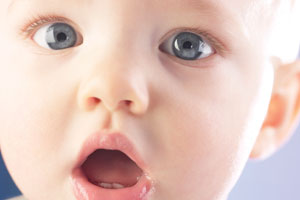
Health Study Will Include St. Louis Kids and Expectant Moms
Until now, every new study about childhood health risks like autism or depression was limited. The studies didn’t track big enough groups of kids early enough and long enough to give solid answers.
like autism or depression was limited. The studies didn’t track big enough groups of kids early enough and long enough to give solid answers.
That will change next year, when the National Children’s Study (NCS) starts collecting data on 100,000 babies before birth. It will follow them for 21 years, recording information on everything from air, water and dust to the placenta, genetics and cultural influences. Along the way, the researchers will announce what they’ve learned.
“What is most remarkable is that we’ll be able to look at a wide range of environmental exposures – and do so early enough to characterize the entire period of risk,” said Dr. Louise Flick. She’s a professor of epidemiology at Saint Louis University and principal investigator in the Gateway Study Center, which includes St. Louis City and Jefferson County in Missouri plus the Illinois counties of Macoupin, Johnson, Williamson and Union.
An undertaking so huge takes a lot of planning (more than a decade already), and it’s too important to leave anything to chance. That’s why some of the 30 study locations across the United States started doing “practice” studies two years ago. The idea is to make sure that signing up participants and gathering data goes smoothly when it counts.
St. Louis City is part of the second wave of these vanguard studies. The Gateway Study Center team has begun recruiting 100 women who are in the early weeks of pregnancy or trying to get pregnant. While their babies won’t be part of the main study, they will be followed for the full 21 years, and the information researchers learn from them will help improve the way the main study is structured.
What scientists hope to learn
“Autism was one of the motors for the study in Congress,” Flick explained, “because we don’t have very good information about [it].” And while this study won’t prove what causes autism, “it will provide good information about potential risk factors and how to design the next stage of studies.”
But autism is far from the only question the National Children’s Study is looking at. Everything related to children’s health and development is on the table.
The first results, expected about six months after the last of the 100,000 babies is born, will look at topics near and dear to Flick’s heart: prenatal development and birth outcomes. She is interested in a whole spectrum of factors: how the placenta functions, what happens when the mother has a fever, environmental exposures during pregnancy and, especially, psychological issues. Her own mother was schizophrenic, and Flick’s professional life has been focused on understanding “what are the situations that help children in vulnerable families develop in a healthy way.”
Her fellow researcher Dr. Allison King, an assistant professor of pediatrics at Washington University, looks at children’s development in an older age bracket. She’s a pediatric hematologist and oncologist who studies “the educational and cognitive outcomes of children with chronic diseases such as sickle cell disease and cancer.”
The key word there is “educational.” Traditionally, King said via e-mail, doctors looked only at kids’ medical conditions when they wanted to find out who got better and who didn’t. With this study, they will be drawing in factors like “family dynamics, educational background, mental health and parenting skills,” said King. “Few, if any, people are bridging that gap between the hospital and educational setting. I hope that our work can help our team do just that.”
Hundreds of researchers at the 30 sites across the country will be investigating other niches. But in the meantime, all of them – including Flick and King – are working toward a more basic goal: Getting people signed up.
How the study works
In St. Louis City, participants will come from 15 randomly chosen neighborhoods. The Gateway Study Center team is currently doing a big push to educate medical professionals and expectant moms about getting involved.
Information will be gathered at a hospital visit after a baby is  born, and child development lab work will be done down the road, but the bulk of the research will be carried out through home visits, interviews with parents, specimen samples and medical records.
born, and child development lab work will be done down the road, but the bulk of the research will be carried out through home visits, interviews with parents, specimen samples and medical records.
“Families who participate in the NCS will be generous enough to share their experiences with us in an effort to help children in the future,” said King, herself a mom to newborn twins.
“For example, we may find that exposure to certain environmental factors, in combination with genetic factors, is more likely to lead to preterm birth. We could say the same for obesity, diabetes or autism.”
By Amy De La Hunt, health blogger for SmartParenting and Contributing Editor for St. Louis Kids Magazine. This story appears in the Spring/Summer issue of St. Louis Kids Magazine.




















